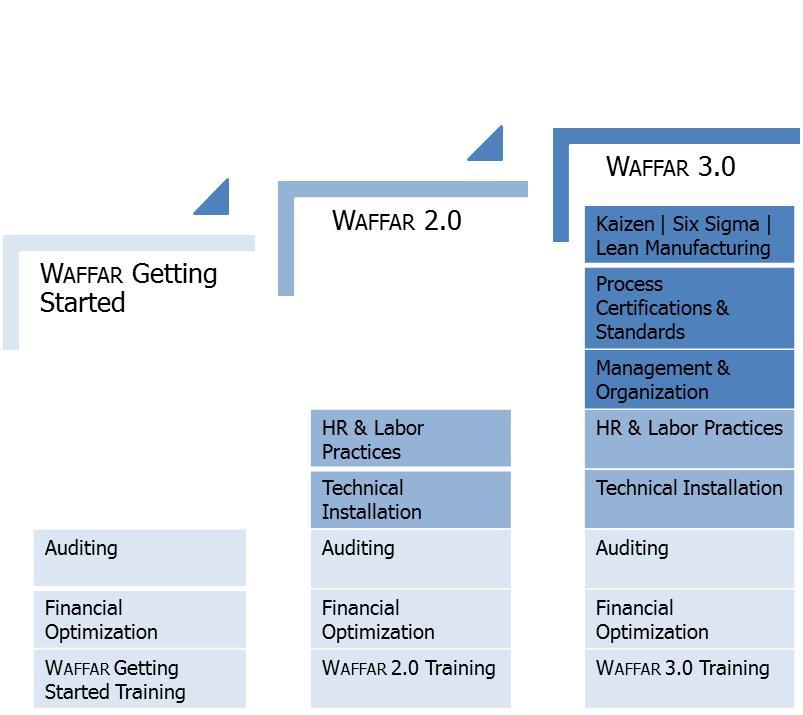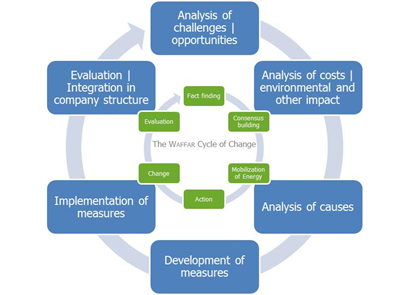WAFFAR

© GIZ
WAFFAR is a service developed by the German International Cooperation (GIZ) on behalf of the Federal Ministry for Economic Cooperation and Development (BMZ) for small and medium-sized companies in the Egyptian Industrial Sector. It aims at practically identifying, developing and implementing measures designed to substantially:
- Reduce production costs
- Improve environmental performance
- Enhance organisational capabilities
The main target is to improve the processes for production efficiency by enhancing the output/input ratio through the efficient usage of resources. This supports the industrial facilities to increase and strengthen their competitiveness and sustainability in the global and local market, and to save costs.
Main features and components
The full WAFFAR qualification is modular and flexible so that the various tools and methods can be combined or adjusted to suit the specific requirements of each company or type of institutional client. WAFFAR contains three different products: “WAFFAR - Getting Started“, “WAFFAR 2.0” and “WAFFAR 3.0“.
“WAFFAR Getting Started” can provide SMEs with the following services:
- Resource efficiency audit using special checklists
- Getting Started Training to the staff on modern efficiency management techniques
- Determine some useful measures and evaluate them
- Prepare a plan for savings of companies’ resources consumption
- Technical help in implementation of the measures
“WAFFAR 2.0” can provide industrial facilities with the following services (extract):
- Energy efficiency detailed audit using professional measuring equipment
- Training and knowledge transfer to the staff on environmental oriented cost management and energy auditing
- Determination of the most effective measures considering investment, potential savings and pay-back period
- Setting an action plan for implementation
WAFFAR 3.0: Kaizen / Six Sigma / Lean Manufacturing, Process Certifications & Standards, Management & Organization, HR & Labor Practices, Technical Installation, Auditing, Financial Optimization, WAFFAR 3.0 Training
Regarding the optimization of production processes towards international standards and therefore to enhance the national and international competitiveness of manufacturing SMEs, WAFFAR 3.0 focuses on Kaizen, Six Sigma and Lean Manufacturing methodologies. These methodologies could be provided and trained by national and international service providers.
Implementation and work steps

This cycle is based on the assumption that change processes, in order to be successful and sustainable, have to go through a determined sequence of phases. If this sequence is not adhered to, or is blocked at a certain stage, the process will run into conflicts, resistance, or will even fail completely. The consequences of “incomplete cycles” are "project torsos" or "project fragments" that increase resistance to change.
In the application of WAFFAR, the external cycle reflects the technical steps followed by the different modules. The inner cycle serves as a map for the change to be implemented by company staff involved in WAFFAR, in order to achieve effective implementation of measures thus reducing NPO and creating a triple win for the company.
Lessons learnt
It is mandatory to get the commitment of the company owners and responsible executives (Executive Sponsorship) to ensure a timewise and budget wise successful implementation. It is a huge asset for the company to establish a core team who is responsible for resource efficiency measures like e.g. definition, implementation and controlling of key performance indicators (KPIs) and finally change management. This will ensure quality, higher competitiveness and return on investment for the companies.
Requirements
Inexpensive implementation
Output
WAFFAR services offers triple win to companies through:
- a systemic approach for the quick identification of problems, their impact and causes, as well as easy-to-implement measures in the field of quality, environment and workplace safety / social issues.
- a systematic analysis of improvement potentials through the Non-Product Output approach.
Downloads
Characteristics
Phase of intervention
Operating SIA, Resource efficiency
Level of intervention
Company
Regions
MENA
Countries
Egypt
Target groups
Company, SME, Industrial area management and operator